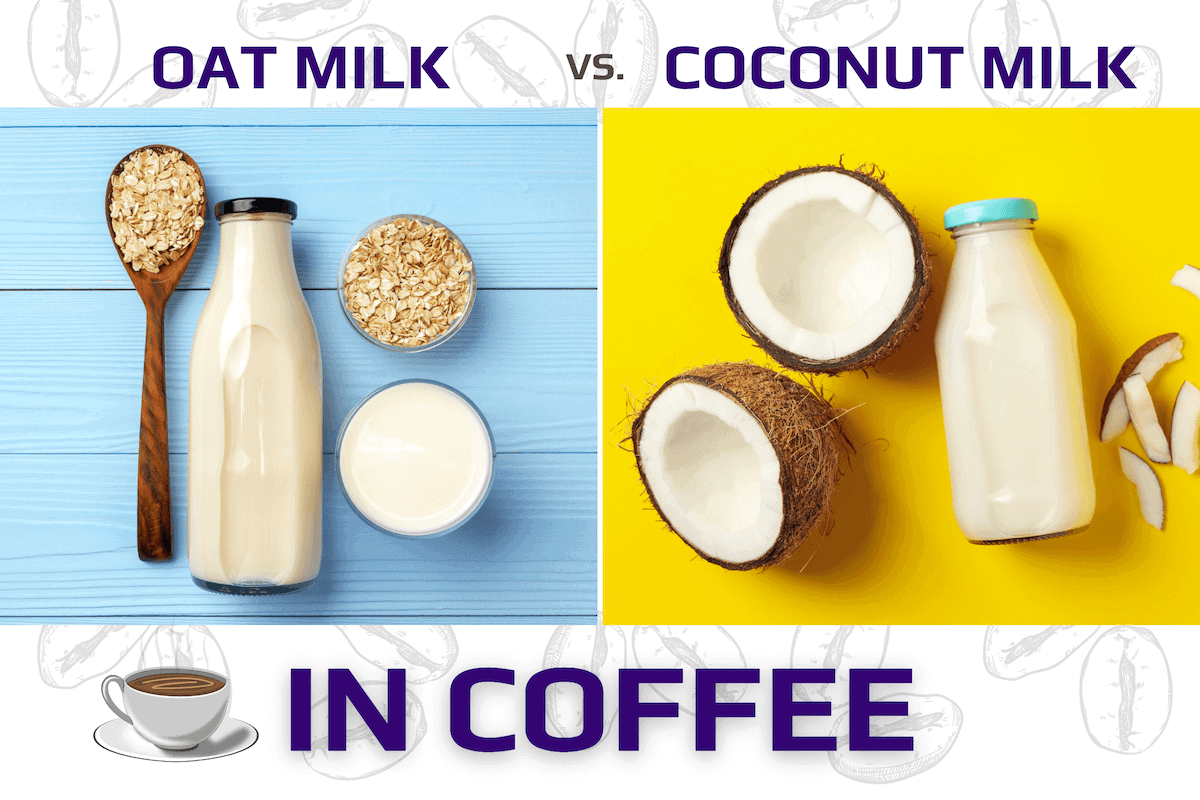As the world becomes more health-conscious, people are exploring alternative milk options to replace traditional dairy milk. Among these options, oat milk and coconut milk have become increasingly popular, especially in coffee drinks. But which one is better? In this article, we’ll compare oat milk vs. coconut milk in coffee, exploring their taste, nutritional value, and environmental impact.
Popularity: Oat Milk vs. Coconut Milk
In recent years, both oat milk and coconut milk have gained popularity as alternatives to cow’s milk in coffee drinks. However, oat milk has become more popular in specialty coffee shops and cafes.
One reason for oat milk’s popularity is its ability to produce a creamy and frothy texture similar to cow’s milk. Oat milk’s neutral taste allows the coffee flavors to shine through, making it a versatile choice for espresso-based drinks such as lattes and cappuccinos.
Coconut milk, on the other hand, has a distinct coconut flavor that may not be suitable for all coffee drinks. It is also more challenging to froth, and may not produce the same velvety microfoam as oat milk.

Oat Milk vs. Coconut Milk In Coffee Shops
Many coffee shops offer oat milk as a standard option for customers who prefer a dairy-free alternative. Some even have multiple brands and varieties of oat milk to choose from. Some coffee shops may also offer coconut milk as an alternative, but it is less commonly available than oat milk.
However, it’s important to note that availability may vary depending on the region, the specific coffee shop, and the preferences of the customer base. Some coffee shops may offer coconut milk as a standard option if it is more prevalent in their area or if there is high customer demand.
Overall, oat milk has become the more popular option in specialty coffee drinks due to its ability to mimic the texture and taste of cow’s milk. However, coconut milk still has a place in the coffee world, particularly for those who enjoy its unique flavor.
Taste In Coffee: Oat Milk vs. Coconut Milk
The taste of oat milk and coconut milk in coffee is a matter of personal preference. Oat milk has a creamy, slightly sweet taste that complements the bitterness of coffee. It has a texture similar to whole milk and is a good option for those who want a milk substitute that is not too overpowering.
On the other hand, coconut milk has a distinctive nutty flavor that can sometimes overwhelm the taste of coffee. It is thinner than oat milk and has a slightly sweeter taste due to its natural sugar content.
How Oat Milk And Coconut Milk Perform When Heated And Frothed
Oat milk behaves similarly to cow’s milk when heated and frothed. It can produce a velvety microfoam that is perfect for latte art and other specialty coffee drinks.
However, oat milk can be more challenging to froth than cow’s milk, and it may require a higher temperature to produce the desired texture. Oat milk can curdle when heated, which is why popular brands like Oatly have created a special barista line that holds up extremely well to heat.
Coconut milk behaves differently from cow’s milk when heated and frothed. It contains less protein than cow’s milk, which makes it more challenging to froth. Coconut milk also has a thinner texture, which can make it difficult to produce a velvety microfoam. Additionally, coconut milk can sometimes separate or curdle when heated, which can be a problem when making specialty coffee drinks.
Oat milk is a better option if you’re looking for a milk substitute that behaves similarly to cow’s milk and can produce a velvety microfoam. Coconut milk can be a good option for those who prefer a thinner texture and are looking for a natural source of sweetness. However, coconut milk can be more challenging to froth and may not produce the desired texture for specialty coffee drinks.

Nutritional Value: Oat Milk vs. Coconut Milk
When it comes to nutritional value, oat milk, and coconut milk have their own unique advantages. Oat milk is higher in fiber and protein, making it a great option for those looking to increase their intake of these nutrients. Coconut milk, on the other hand, is lower in calories so its a great option for those looking to minimize the calories in their coffee. Coconut milk is also high in medium-chain triglycerides (MCTs), which may help reduce body weight.
Nutrition Comparison: Coconut Milk vs Oat Milk
| Per 1 Cup Serving | (Oatly) Oat Milk | (Silk) Coconut Milk |
|---|---|---|
| Calories | 120 | 70 |
| Fat | 5g | 5g |
| Carbs | 16g | 6g |
| Total Sugar | 7g | 5g |
| Protein | 3g | 0g |
| Dietary Fiber | 2g | 0g |
Oat Milk vs. Coconut Milk Ingredients
The ingredients in oat milk and coconut milk are different due to their respective manufacturing processes.
Oat milk is made by blending water and oats, then straining the mixture to remove any solid particles. Many brands add vitamins, minerals, oils, stabilizers, and sweeteners. The ingredients in oat milk typically include water, oats, and a stabilizer such as carrageenan or guar gum.
To enhance the taste, oat milk may also contain natural flavors, such as vanilla or chocolate. Oat milk is typically high in carbohydrates and fiber, enriched with vitamins and minerals, and has no cholesterol.
Coconut milk, on the other hand, is made from the meat of mature coconuts. The coconut meat is blended with water and then strained to remove any solid particles. The resulting liquid is a rich milk with a distinct coconut flavor. Coconut milk may also contain additives such as preservatives or stabilizers to prolong its shelf life. Coconut milk is high in saturated fat, which can raise cholesterol levels, but also contains medium-chain triglycerides (MCTs) that are easily converted to energy in the body.
Ultimately, the choice between oat milk and coconut milk comes down to personal preference and nutritional goals.

Environmental Impact: Oat Milk vs. Coconut Milk
Both oat milk and coconut milk have a lower environmental impact than cow’s milk. Oat milk is made from oats, a sustainable crop that requires less water and produces fewer greenhouse gases than dairy farming. On the other hand, coconut milk is made from coconuts, which are grown in tropical regions and do not require as much water as other crops. However, the production of coconut milk requires more resources than oat milk, as the coconuts need to be transported from tropical regions to other parts of the world.
Final Thoughts
When it comes to oat milk vs. coconut milk in coffee, both options have their pros and cons. Oat milk is an excellent option for those looking for a milk substitute that is low in fat while also high in fiber and protein. On the other hand, coconut milk is a good option for those looking for a milk substitute that is low in calories while also providing a natural source of energy. Ultimately, the choice between oat milk and coconut milk in coffee comes down to personal preference and nutritional goals.
Recent Posts
So you've decided to use non-dairy milk in your coffee. Great! But now what? Do you choose soy, almond, or oat milk? Or what about coconut, rice, hemp, or even avocado milk? Which one is the most...


